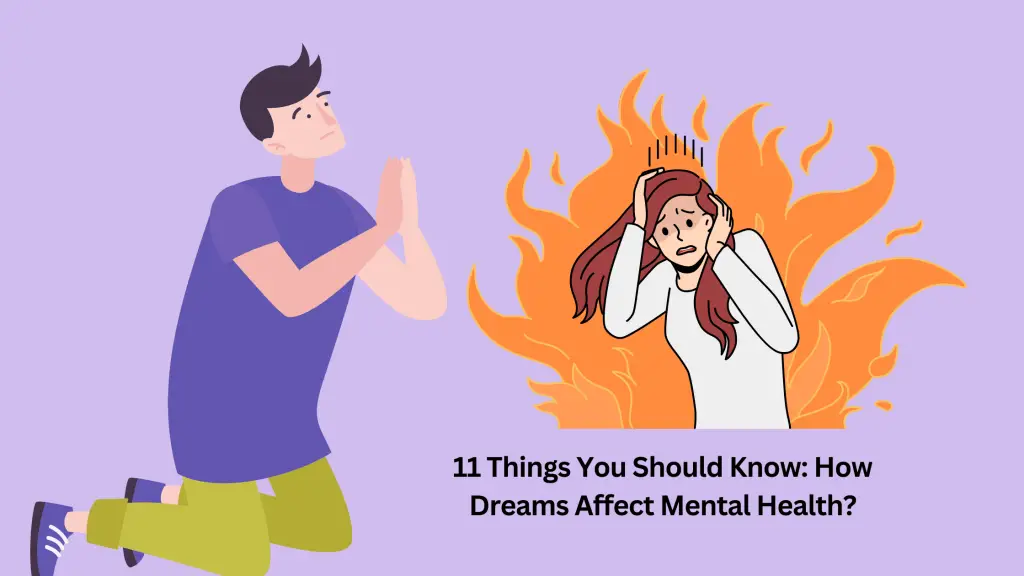
People are always curious about how dreams affect their mental health. The facts may differ from what you believe, dreams can actually have a profound impact on how you feel and think.
When we dream, our brain is actually working in overdrive, processing information and sorting out problems that may be bothering us. Dreams can help you work through internal conflicts, process emotions, and even develop new perspectives.
In this blog, we will explore what you don’t know about how dreams affect mental health.
So What are those things you should know?
1. Emotional experiences and dreams are closely related
Dreams frequently represent our feelings and life events. In other words, the more emotional dreams we have, the more real experiences we have.
When we are dealing with emotional issues, our dreams frequently become more intense.
2. Emotional states and experiences can be represented in dreams
Dreams provide us with a glimpse into our emotions, allowing us to delve deeper and gain understanding.
When we have dreams that accurately depict an emotional experience we are going through, it might be helpful for us to understand more about our emotional state.
3. Dreams can aid in stress management and emotional regulation
Dreams can help us process our emotions and move past them. It might also enable us to handle stress more effectively.
If we can process our sentiments in our dreams, it might make it simpler for us to deal with challenging circumstances that are not in line with our plans.
4. The impact of dreams on people with mental problems is yet uncertain
Dreams may affect mental illnesses, although the exact mechanism is yet unclear.
Although the precise causes are still unknown, studies have revealed that persons with mental health conditions may have more nightmares on a regular basis.
5. Sleepless nights might be detrimental to mental health
Nightmares can be particularly disturbing and detrimental to one’s mental health. The negative emotions brought on by dreams can remain for a very long time after we wake up and spill over into our daily lives.
People who experience nightmares may find it helpful to learn coping mechanisms.
6. Lucid dreaming can help with mental health
Lucid dreaming can be a helpful experience and a therapeutic tool for dealing with issues.
It gives us the chance to safely explore our emotions while getting a better understanding of how we’re feeling.
7. Therapy for mental illness and dreaming is evolving.
To assist people to work through their dreams and enhance their mental health, therapy is being employed more and more.
We can better comprehend what our dreams are trying to tell us and how they might be affecting our mental health with the aid of dream analysis and other forms of treatment.
8. The value of identifying patterns in dreams to enhance mental health
Finding patterns in our dreams might aid in mental health improvement.
By paying attention to the types of dreams we experience and the patterns that appear, we can gain an understanding of our emotional states and how to better control them.
9. Dreams can affect emotional and mental health in both ways.
Dreams have both beneficial and harmful effects on mental health.
It is important to realize that even while some dreams may elicit strong feelings, they can also provide light on our emotional state and guide us toward more useful coping techniques.
10. Self-care improves mental health
By taking care of ourselves, we may reduce our stress and improve our overall mental health. A few examples of self-care practices include obtaining enough sleep, eating a healthy diet, exercising frequently, meditating, and engaging in fun activities.
11. The impact of dream sharing on mental health
Our mental health may benefit from discussing our dreams with a therapist or close friend.
We can better comprehend our emotions and find coping techniques by talking about our dreams. We can process our emotions and develop a better understanding of ourselves by talking about our dreams in a safe environment.
Which dreams can affect mental health?
Stress dreams
Stress dreams are common and may be a sign of underlying stress or worry. Gaining insight into these dreams and learning techniques for reducing daily stress can improve mental health.
Stress dreams can affect mental health by triggering emotions such as anxiety, fear, or sadness. Working through these feelings can help to reduce their negative impact on mental health.
Recurring dreams
Recurring dreams are a sign that an issue or emotion needs to be addressed. Finding answers to these issues can improve mental health.
Recurring dreams can generate anxiety and desperation if left untreated because the person having them may feel overpowered by the intensity of the feelings they arouse and by their inability to understand their significance.
If a person is unable to make sense of their recurring dreams, they may become quite disturbing and may even result in physical symptoms of stress like headaches and stomachaches.
Nightmares
Nightmares can be upsetting and may be harmful to one’s mental health. Developing coping mechanisms for nightmares can be helpful and may enhance emotional well-being.
It is vital to understand that dreams are typically a mirror of our own internal difficulties and not always an indication of hazards in the outside world.
Lucid dreaming
By enabling dreamers to exert control over their dreams and resolve their problems in a secure environment, lucid dreaming can be utilized as a method to improve mental health.
Practicing lucid dreaming, if you feel comfortable doing so, can be a terrific method to understand your emotions and discover coping mechanisms for them.
Déjà Vu Dreams
Premonition dreams, also referred to as déjà vu dreams, can affect mental health since they can elicit strong emotions like fear or confusion.
This could also lead to increased worry and anxiety because the dreamer may not understand the significance of the dreams.
For instance, if you don’t understand the meaning of a dream that predicts something will happen in the future, it could make you anxious. It can also be emotionally exhausting and challenging to distinguish between reality and fantasy when you have the same dream repeatedly.
Positive dreams
Studies show that those who remember their dreams and report having good dream experiences perform better on measures of well-being than people who do not.
Positive dreamers assert that they are generally happier, less stressed and anxious, and more confident. Positive dreams can also help you get through difficult emotions like regret or remorse.
Your positive dreams can provide you with emotional support and guidance while you navigate difficult situations in your life. They might also assist you in putting your own behaviors into perspective and understanding why you act the way you do.
How do dreams connect to emotional wellness?
Dreams may contribute to our emotional well-being by disclosing our innermost thoughts and feelings. To safely release negative feelings like dread, worry, and anxiety, one might dream.
Since we may express our feelings freely when we dream, dreams can be a tool for resolving emotional problems and better understanding our inner thoughts.
By putting our own emotions and impulses into perspective, dreams can also help us understand our actions. As a result, we may be able to regain control of our behavior and make better decisions.
What do the symbols use to decode emotional states in dreams mean?
The symbolism in our dreams could provide insight into our emotional states. Everything from animals to colors to objects to locations has a symbolic significance that might help us understand our emotions.
Most frequently, symbols in dreams relate to the dreamer’s current emotional state. For instance, while dreaming about an animal can indicate strength or protection, dreaming about water can reflect negative emotions like dread or despair.
With the aid of one of the many dream dictionaries that are easily accessible online, you can decipher the symbols in your dreams. It is essential to remember that these interpretations are subjective and should be used with caution.
Why could dreams impact your mental well-being?
Dreams can have an effect on our mental health because they provide us with a safe and controlled environment to manage our emotions. We can communicate feelings in our dreams that we might not be able to name or even verbalize.
Through dreams, we can unlock hidden aspects of who we are and gain access to our subconscious. Dreams have the power to bring back buried emotions, unresolved issues, and experiences that have been forgotten for a very long time.
This could either improve or worsen our mental health. Dreams can, on the one hand, help us understand who we are and provide us with clarity, but they can also make us feel uncomfortable or anxious if we are unable to comprehend and deal with our feelings.
How long will dreams continue to influence our mental health?
The effects of dreaming on one’s mental health might vary greatly depending on the type and frequency of one’s dreams. Dreams can either have a short-term or long-term effect on our emotional health, depending on the individual.
A person’s mental health may suffer if they experience frequent nightmares or traumatic dreams, yet it may benefit them if they have hopeful dreams about the future.
Others may believe that either/or, or that what transpires in our dreams has an impact on how we interact with others and the rest of the world on a daily basis.
Final thoughts
Many people don’t consider dreams to be substantial enough to have an effect on their mental health and don’t treat them properly. But research has shown that our dreams have a big influence on our mental health and general well-being.
We may be able to process our emotions, comprehend our conduct, and find the motivation to achieve our goals very effectively through the use of dreams.
Dreams are a way for us to communicate with our inner selves as well as a way to escape reality. Pay attention to your dreams and take the time to understand them in order to enhance your emotional well-being and mental health.







